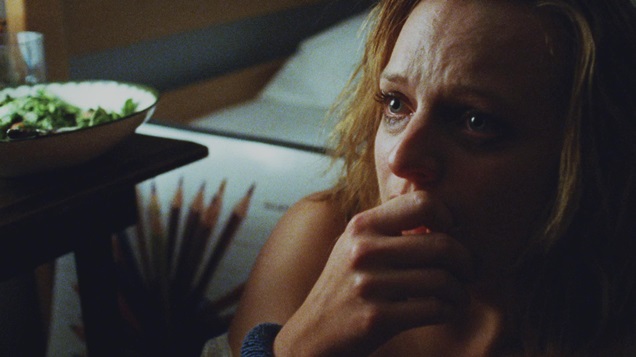AND OTHER LINKS BETWEEN ALEX ROSS PERRY & BRIAN DE PALMA

One of last year's best films was Alex Ross Perry's bitingly sardonic Listen Up Philip. Perry's new film, Queen Of Earth just premiered at the Berlin International Film Festival, and many are highly impressed. "A deep-dish cinephile with a pronounced affection for late 1960s/early 1970s alt-Hollywood cinema," writes Variety critic Scott Foundas, "Perry is working this time in a style that seems equally influenced by doppelganger narratives like Bergman’s Persona and Brian De Palma’s Sisters, as well as by the claustrophobic domestic terror of Repulsion and Chantal Akerman’s seminal Jeanne Dielman. (Perry himself has also cited Woody Allen’s Interiors as a key influence.)"
Perry tells Indiewire's Eric Kohn about making a smaller film this time around, and movies that inspired Queen Of Earth:
"All this came together during a Fassbinder retrospective at the Film Society of Lincoln Center. I went to a double bill of The Bitter Tears of Petra von Kant and Martha. I knew that was the kind of movie I wanted to make. From there, it became this fun little maze of what other kind of movies you can fold into this — you can take a very sad, emotional drama and find yourself talking about a cheap horror movie like Carnival of Souls and realizing it's more connected to those other films than they seem.
"The common thread here is these really interesting women stories — these unique, threatening and occasionally frightening stories about the troubles of broken women. That's the driving force behind almost all of Fassbinder's films. So immersing in a retrospective gives you time to marinate in this theme of women under extreme duress. But then you look at Carnival of Souls, or Roman Polanski's Repulsion, and it takes the form of exaggerated gothic horror. Then you look at Robert Altman's Images, which straddles both lines and becomes a fascinating text of its own. In his body of work, at the time of that film and now, that one sort of sticks out as this quasi-horror experiment. Then I was also thinking of Woody Allen's Interiors, which is as quiet a drama as you can have. I wanted this movie to live in this cinematic world of broken women."
Last September, Perry tweeted an image from De Palma's Body Double in response to being tagged to post a #cinephilephoto. And he mentions De Palma in an interview with Richard Porton in the Winter 2014 issue of Cineaste. Asked by Porton how working at Kim's Video influenced his film education, Perry replies, "That overlapped with my time at NYU. I distilled it down to one point: Working at a place like that taught me not to be afraid of what I liked. Film school teaches you to be very afraid of what you like. You don't want to be the one who stands up in class and says, 'I think Sylvester Stallone is an incredible director.' You're going to look like an idiot, especially at NYU where everyone is trying to be as highbrow as possible. Working at Kim's taught me, working with people like Sean [Price Williams], to like what you like. But you have to defend what you like about these films. You could come into Kim's and say, 'I want to rent the two-tape edition of The Mother And The Whore.' Eustache is an incredible filmmaker. But you needed to defend why you were renting Staying Alive or Rocky IV. Stallone is an incredible filmmaker and even Jean Eustache respected him.
"That's a lesson you'll never be taught in an academic setting—how to equally appreciate high and low cinema. At NYU, people might see Brian De Palma as a trashy filmmaker who made pulpy movies in the Eighties. When you were working at Kim's, Brian De Palma was the master."
Updated: Sunday, February 8, 2015 2:11 AM CST
Post Comment | View Comments (1) | Permalink | Share This Post



